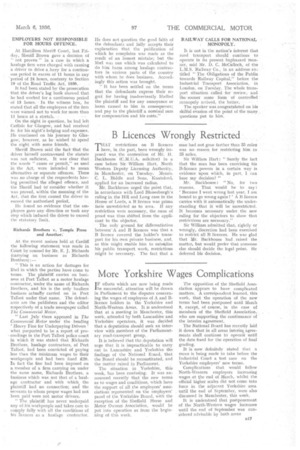EMPLOYERS NOT RESPONSIBLE FOR HOURS OFFENCE.
Page 27

If you've noticed an error in this article please click here to report it so we can fix it.
At Hamilton Sheriff Court, last Friday, Sheriff Brown gave a decision of " not proven " in a case in which a haulage firm were charged with causing a driver to drive a., lorry for a continuous period in excess of 11 hours in any period of 24 hours, contrary to Section 19 of the Road Traffic Act, 1930.
It had been stated by the prosecution that the driver's log book showed that he had worked for a continuous period of 13 _hours. In the witness box, he stated that all the employees of the fain a ere warned not to work for more than 1I hours at a stretch...
On the night in question, he had left Carlisle for Glasgow, and had received 5s. for his night's-lodging and expenses. He continued on his journey to Glasgow; however, as he •wished to spend the night with some friends.
Sheriff Brown said the fact that the driver himself contravened the statute was not sufficient. It was clear that the words " cause or permit," as used in the Act, were intended to mean alternative or separate offences. There was no charge of the respondents having permitted the alleged offence, and the Sheriff had to consider whether it was proved, within the meaning of the Act, that the firm caused the driver to exceed the authorised period.
He found no evidence that the employers gave any direction or took any step which induced the driver to exceed the statutory. limit.
Richards Brothers v. Temple Press • . and Another:.
At the recent assizes held at Cardiff the following statement was made in Conti by counsel for Mr. E. J. Richards (carrying on business as Richards Brothers):— • " This is an action for damages for libel in which the parties have come to terms. The plaintiff carries on business at Port Talbot as a niotor haulage contractor,, under the name of Richards Brothers, and his is the only hauliers business actually carried on in Port Talbot under that name. The defendants are the publishers and the editor respectively of a trade newspaper called The Commercial Motor.
" Last July there appeared in The Commercial Motor under the heading ' Heavy Fine for Underpaying Drivers' what purported to be a report of proceedings in the Port Talbot police court in -which it was stated -that Richards Brothers, haulage contractors, of Port Talbot, had been convicted of paying less than the minimum wages to their workpeople and had been fined £20. In fact the fine had been imposed on a member of a firm carrying on under the same name, Richards Brothers, a business which was not that of a haulage contractor and with which the plaintiff had no connection; and the servants to whom proper wages had not been paid were not motor drivers.
" The plaintiff has never underpaid any of. his workpeople and takes care to comply fully with all the conditioes of his licences as a haulage contractor. He does not question the good faith of the defendants and fully accepts their explanation that the publication of which he complains was made as the result of an honest mistake; but the libel was one which was calculated to do him harm among haulage contractors in various parts of the country with whom he does business. Accordingly this action was brought.
." It has been settled on the terms that the defendants express their regret for having inadvertently libelled the plaintiff and for any annoyance or harm caused to him in consequence; and pay to the plaintiff a nominal sum for compensation and his cdets." RAILWAY CALLS FOR NATIONAL : MONOPOLY.
It is not in the nation's interest that road transport should . continue IA operate in its present haphazard man• ner, said Mr. D. C. McCulloch, of the L.M.S. Railway Co., in an address en. titled " The Obligations of the Public towards Railway Capital," before the Industrial Transport Association, in London,. on Tuesday. The whole frans port situation,' ealled•for review; and. the sooner some forin of COD trdhled monopoly arrived, the better, •• • ' The speaker was .congratulated on his skilful evasion of the point of the iiianya • queStions Put to him.




















































































